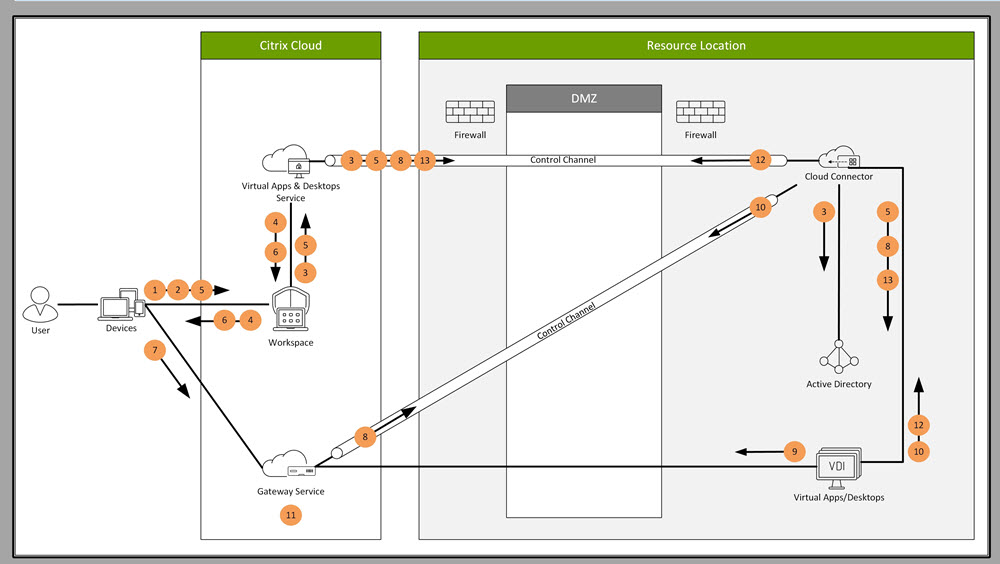Rendezvous protocol
In environments that use the Citrix Gateway service, the Rendezvous protocol allows HDX sessions to bypass the Citrix Cloud Connector™ and connect directly and securely to the Citrix Gateway service.
Requirements
- Access to environment using Citrix Workspace™ and Citrix Gateway service.
- Control Plane: Citrix Virtual Apps and Desktops™ Service (Citrix Cloud).
- Linux VDA Version 2112 or later.
- Enable the Rendezvous protocol in the Citrix policy. For more information, see Rendezvous protocol policy setting.
- The VDAs must have access to
https://*.nssvc.net, including all subdomains. If you cannot whitelist all subdomains in that manner, usehttps://*.c.nssvc.netandhttps://*.g.nssvc.netinstead. For more information, see the Internet Connectivity Requirements section of the Citrix Cloud documentation (under Virtual Apps and Desktop service) and the Knowledge Center article CTX270584. - Cloud Connectors must obtain the VDAs’ FQDNs when brokering a session. To achieve this goal, enable DNS resolution for the site: Using the Citrix Virtual Apps and Desktops Remote PowerShell SDK, run the command
Set-BrokerSite -DnsResolutionEnabled $true. For more information about the Citrix Virtual Apps and Desktops Remote PowerShell SDK, see SDKs and APIs.
Proxy configuration
The VDA supports establishing Rendezvous connections through an HTTP proxy.
Proxy considerations
Consider the following when using proxies with Rendezvous:
-
Non-transparent HTTP proxies are supported.
-
Packet decryption and inspection are not supported. Configure an exception so that the ICA® traffic between the VDA and the Gateway Service is not intercepted, decrypted, or inspected. Otherwise, the connection breaks.
-
HTTP proxies support machine-based authentication by using the Negotiate and Kerberos authentication protocols. When you connect to the proxy server, the Negotiate authentication scheme automatically selects the Kerberos protocol. Kerberos is the only scheme that the Linux VDA supports.
Note:
To use Kerberos, you must create the service principal name (SPN) for the proxy server and associate it with the proxy’s Active Directory account. The VDA generates the SPN in the format
HTTP/<proxyURL>when establishing a session, where the proxy URL is retrieved from the Rendezvous proxy policy setting. If you don’t create an SPN, authentication fails. -
For an HTTP proxy, use TCP as the transport protocol for ICA.
Non-transparent proxy
When using a non-transparent proxy in your network, configure the Rendezvous proxy configuration setting. When the setting is enabled, specify the HTTP proxy address for the VDA to know which proxy to use. For example:
- Proxy address:
http://<URL or IP>:<port>
Rendezvous validation
If you meet all requirements, follow these steps to validate if Rendezvous is in use:
- Launch a terminal on the VDA.
- Run
su root -c "/opt/Citrix/VDA/bin/ctxquery -f iuStdP". - The TRANSPORT PROTOCOLS indicates the type of connection:
- TCP Rendezvous: TCP - SSL - CGP - ICA
- EDT Rendezvous: UDP - DTLS - CGP - ICA
- Proxy through Cloud Connector: TCP - CGP - ICA
Tip:
If you enable Rendezvous and the VDA cannot reach the Citrix Gateway service directly, the VDA falls back to proxy the HDX™ session through the Cloud Connector.
How Rendezvous works
This diagram is an overview of the Rendezvous connection flow.

Follow the steps to understand the flow.
- Navigate to Citrix Workspace.
- Enter credentials in Citrix Workspace.
- If using on-premises Active Directory, the Citrix Virtual Apps™ and Desktops service authenticates credentials with Active Directory using the Cloud Connector channel.
- Citrix Workspace displays enumerated resources from the Citrix Virtual Apps and Desktops service.
- Select resources from Citrix Workspace. The Citrix Virtual Apps and Desktops service sends a message to the VDA to prepare for an incoming session.
- Citrix Workspace sends an ICA file to the endpoint that contains an STA ticket generated by Citrix Cloud.
- The endpoint connects to the Citrix Gateway service, provides the ticket to connect to the VDA, and Citrix Cloud validates the ticket.
- The Citrix Gateway service sends connection information to the Cloud Connector. The Cloud Connector determines if the connection is supposed to be a Rendezvous connection and sends the information to the VDA.
- The VDA establishes a direct connection to the Citrix Gateway service.
- If a direct connection between the VDA and the Citrix Gateway service isn’t possible, the VDA proxies its connection over the Cloud Connector.
- The Citrix Gateway service establishes a connection between the endpoint device and the VDA.
- The VDA verifies its license with the Citrix Virtual Apps and Desktops service through the Cloud Connector.
- The Citrix Virtual Apps and Desktops service sends session policies to the VDA through the Cloud Connector. Those policies are applied.